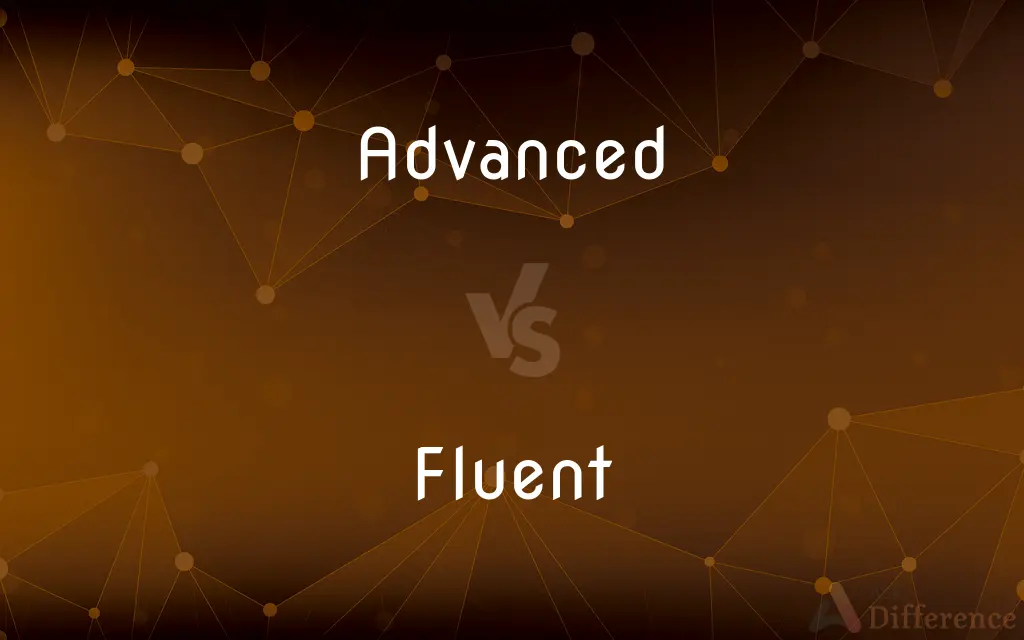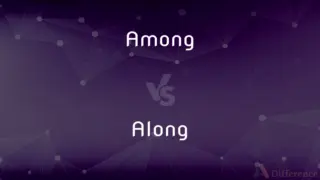Advanced vs. Fluent — What's the Difference?
By Urooj Arif & Fiza Rafique — Updated on March 25, 2024
Advanced language proficiency involves deep knowledge and complex usage, while fluency emphasizes smooth, natural communication without hesitation.

Difference Between Advanced and Fluent
Table of Contents
ADVERTISEMENT
Key Differences
Advanced proficiency in a language means having a strong grasp of grammar, a broad vocabulary, and the ability to understand and produce complex sentences and ideas. On the other hand, fluency is characterized by the ability to communicate smoothly and effortlessly in real-time conversations, often without having to pause for thought or search for words.
While advanced speakers may excel in writing and formal communication, demonstrating a deep understanding of nuanced expressions and complex grammatical structures, fluent speakers might shine in everyday conversations, where their ability to speak smoothly and naturally comes to the forefront. Advanced proficiency often involves a more academic or professional command of the language, whereas fluency highlights ease of communication in daily interactions.
An advanced level of language proficiency typically indicates a high degree of competency in reading, writing, and comprehension, including the ability to engage with specialized or technical material. Fluent speakers, while they might not always use the language perfectly, can understand and be understood with ease, making their language use appear effortless and natural.
In terms of language learning and usage, achieving an advanced level often requires extensive study and practice, focusing on expanding vocabulary, mastering grammatical rules, and understanding cultural nuances. Fluency, however, is developed through immersive experiences and practice in speaking and listening, aiming for a natural flow of conversation rather than perfection in grammar or vocabulary.
The distinction between advanced and fluent is not always clear-cut, as they can overlap. A language learner might achieve fluency in everyday conversations long before reaching an advanced level of proficiency that includes understanding complex texts or professional jargon. Conversely, one might have advanced knowledge of a language's structure and vocabulary yet struggle with the fluidity and ease of a fluent speaker in casual conversation.
ADVERTISEMENT
Comparison Chart
Focus
Deep knowledge and complex usage
Smooth, natural communication
Strengths
Grammar, vocabulary, complex ideas
Effortless conversation, natural flow
Usage
Academic, professional, nuanced expressions
Everyday conversations, ease of understanding
Learning Approach
Extensive study, mastering rules, technical material
Immersive experiences, practicing speaking and listening
Indicator
Competency in reading, writing, comprehension
Ability to speak and listen without hesitation
Compare with Definitions
Advanced
Often involves a more formal or academic use of the language.
Her advanced skills in English were evident in her scholarly articles and presentations.
Fluent
Characterized by ease in expressing thoughts and understanding others in real-time conversations.
His fluency in Spanish enables him to negotiate and joke with native speakers without hesitation.
Advanced
Involves studying nuanced grammatical structures and specialized vocabulary.
Achieving an advanced level in Spanish required him to master the subjunctive mood and idiomatic expressions.
Fluent
Centers around everyday communication, showing naturalness and spontaneity.
Despite occasional grammatical errors, her fluency in French makes her an effective communicator.
Advanced
Having a deep understanding of a language, including complex grammar and a broad vocabulary.
Her advanced proficiency in French allows her to read and discuss complex philosophical texts.
Fluent
The ability to communicate smoothly and effortlessly in a language.
She's fluent in Italian, conversing easily with locals during her stay in Rome.
Advanced
Capable of engaging in detailed discussions and understanding technical or literary texts.
With his advanced knowledge of Japanese, he could understand and explain intricate historical documents.
Fluent
Evidenced by the ability to engage in conversations without searching for words or phrases.
His fluency in Russian was apparent from the seamless way he switched between discussing sports, politics, and culture.
Advanced
Demonstrated through the ability to navigate complex ideas and expressions.
His advanced command of the German language was recognized when he won the national essay competition.
Fluent
Emphasizes practical speaking and listening skills, often through immersion.
Becoming fluent in Mandarin was easier for her after spending a year in Beijing.
Advanced
Far on or ahead in development or progress
Negotiations are at an advanced stage
Fluent
Able to express oneself easily and articulately
A fluent speaker and writer on technical subjects
Advanced
Highly developed or complex.
Fluent
Smoothly graceful and effortless
His style of play was fast and fluent
Advanced
Being at a higher level than others
An advanced text in physics.
Fluent
Able to flow freely; fluid
A fluent discharge from the nose
Advanced
Ahead of the times; progressive
Advanced teaching methods.
Fluent
Able to express oneself readily and effortlessly
A fluent speaker.
Fluent in three languages.
Advanced
Far along in course or time
An advanced stage of illness.
A person of advanced age.
Fluent
Flowing effortlessly; polished
Speaks fluent Russian.
Gave a fluent performance of the sonata.
Advanced
Simple past tense and past participle of advance
Fluent
Flowing or moving smoothly; graceful
A yacht with long, fluent curves.
Advanced
At or close to the state of the art.
Fluent
Flowing or capable of flowing; fluid.
Advanced
With greater complexity, more difficult
The option can be found under advanced settings.
I'm taking a course in advanced knitting techniques.
Fluent
That flows; flowing, liquid.
Fluent handwriting
Advanced
Having moved forward in time or space (e.g. advanced ignition timing).
Fluent
(linguistics) Able to use a language accurately, rapidly, and confidently – in a flowing way.
She's fluent in French.
Advanced
In a late stage of development; greatly developed beyond an initial stage.
This is an advanced prototype, it already has most of the features the final product will have.
Fluent
A continuous variable, especially one with respect to time in Newton's Method of Fluxions.
Advanced
(phonetics) Pronounced farther to the front of the vocal tract.
Fluent
Flowing or capable of flowing; liquid; glodding; easily moving.
Advanced
Indicating a time ahead of the correct time.
Fluent
Ready in the use of words; voluble; copious; having words at command; and uttering them with facility and smoothness; as, a fluent speaker; hence, flowing; voluble; smooth; - said of language; as, fluent speech.
With most fluent utterance.
Fluent as the flight of a swallow is the sultan's letter.
Advanced
In the van or front.
Fluent
A current of water; a stream.
Advanced
In the front or before others, as regards progress or ideas; as, advanced opinions, advanced thinkers.
Fluent
A variable quantity, considered as increasing or diminishing; - called, in the modern calculus, the function or integral.
Advanced
Far on in life or time.
A gentleman advanced in years, with a hard experience written in his wrinkles.
Fluent
Easy and graceful in shape;
A yacht with long, fluent curves
Advanced
Farther along in physical or mental development;
The child's skeletal age was classified as `advanced'
Children in the advanced classes in elementary school read far above grade average
Fluent
Smooth and unconstrained in movement;
A long, smooth stride
The fluid motion of a cat
The liquid grace of a ballerina
Liquid prose
Advanced
Comparatively late in a course of development;
The illness had reached an advanced stage
An advanced state of exhaustion
Fluent
Expressing yourself readily, clearly, effectively;
Able to dazzle with his facile tongue
Silver speech
Advanced
Ahead of the times;
The advanced teaching methods
Had advanced views on the subject
A forward-looking corporation
Is British industry innovative enough?
Advanced
At a higher level in training or knowledge or skill;
An advanced degree
An advanced text in physics
Special seminars for small groups of advanced students at the University
Advanced
Ahead in development; complex or intricate;
Advanced technology
A sophisticated electronic control system
Advanced
Far along in time;
A man of advanced age
Advanced in years
A ripe old age
The ripe age of 90
Advanced
(of societies) highly developed especially in technology or industry;
Advanced societies
An advanced country technologically
Advanced
Situated ahead or going before;
An advance party
At that time the most advanced outpost was still east of the Rockies
Common Curiosities
Can you be fluent without being advanced?
Yes, you can speak a language fluently in everyday contexts without mastering its complex grammatical structures or specialized vocabulary.
What is advanced proficiency in a language?
Advanced proficiency indicates a deep understanding of a language's grammar, vocabulary, and ability to use it in complex contexts.
Is it possible to be advanced in a language but not fluent?
Yes, one can have advanced knowledge of a language but may struggle with fluid communication in casual, spontaneous conversations.
How can immersion help in becoming fluent?
Immersion helps by providing constant, varied opportunities to practice and use the language in real-life situations, enhancing natural communication skills.
How does fluency differ from advanced proficiency?
Fluency is about smooth and natural communication in a language, while advanced proficiency involves a deeper knowledge and complex usage.
What are the key indicators of fluency?
The key indicators include the ability to communicate ideas smoothly and understand others without significant hesitation.
What's the focus of learning for advanced language proficiency?
The focus is on expanding vocabulary, mastering grammatical rules, and understanding cultural nuances and idiomatic expressions.
Can fluency be measured?
Fluency can be observed in the natural flow of conversation and the speaker's ability to express thoughts and respond to others without undue hesitation.
How do you achieve fluency in a language?
Fluency is achieved through immersive experiences and regular practice in speaking and listening to the language in a variety of contexts.
What role does culture play in achieving advanced proficiency?
Understanding cultural contexts and nuances is crucial for advanced proficiency, as it enhances comprehension and appropriate use of the language.
What challenges do advanced language learners face?
They often face the challenge of mastering nuanced expressions, idiomatic phrases, and specialized vocabulary relevant to specific fields.
Is it better to focus on becoming fluent or achieving an advanced level?
The focus depends on your goals: fluency for effective everyday communication, or advanced proficiency for academic, professional, or technical use of the language.
What does it mean to have an advanced level of language learning?
It means having a high level of competency in reading, writing, and understanding the language, including technical or specialized material.
Does being fluent mean you can understand everything in a language?
Being fluent means you can communicate and understand effectively, but it doesn't necessarily mean understanding every word or complex text.
How important is grammar in achieving fluency?
While grammar is important, fluency emphasizes the ability to communicate effectively and naturally, even if minor grammatical errors occur.
Share Your Discovery

Previous Comparison
Among vs. Along
Next Comparison
Classic vs. TimelessAuthor Spotlight
Written by
Urooj ArifUrooj is a skilled content writer at Ask Difference, known for her exceptional ability to simplify complex topics into engaging and informative content. With a passion for research and a flair for clear, concise writing, she consistently delivers articles that resonate with our diverse audience.
Co-written by
Fiza RafiqueFiza Rafique is a skilled content writer at AskDifference.com, where she meticulously refines and enhances written pieces. Drawing from her vast editorial expertise, Fiza ensures clarity, accuracy, and precision in every article. Passionate about language, she continually seeks to elevate the quality of content for readers worldwide.















































